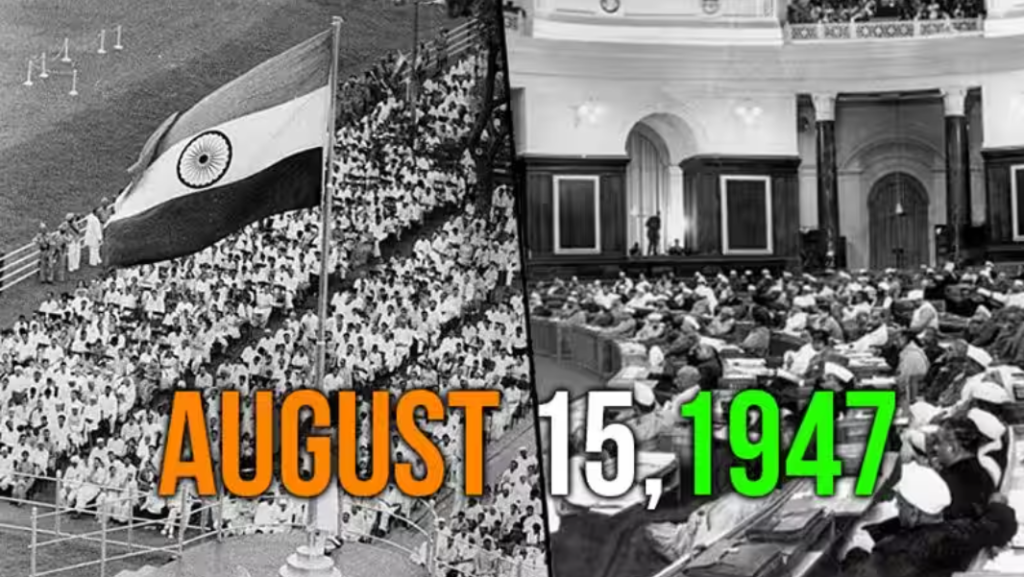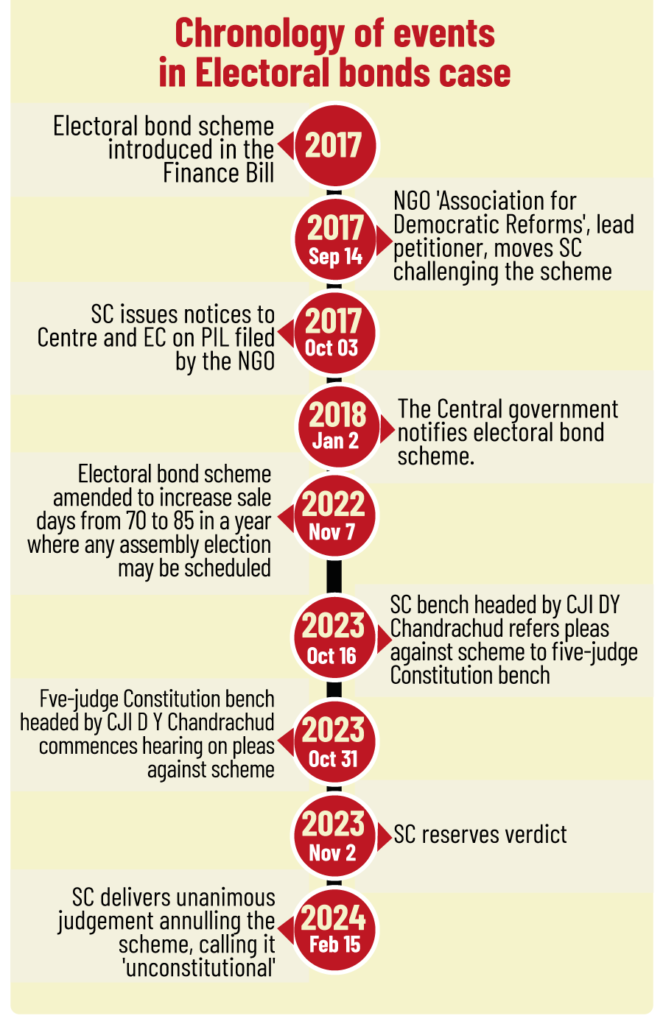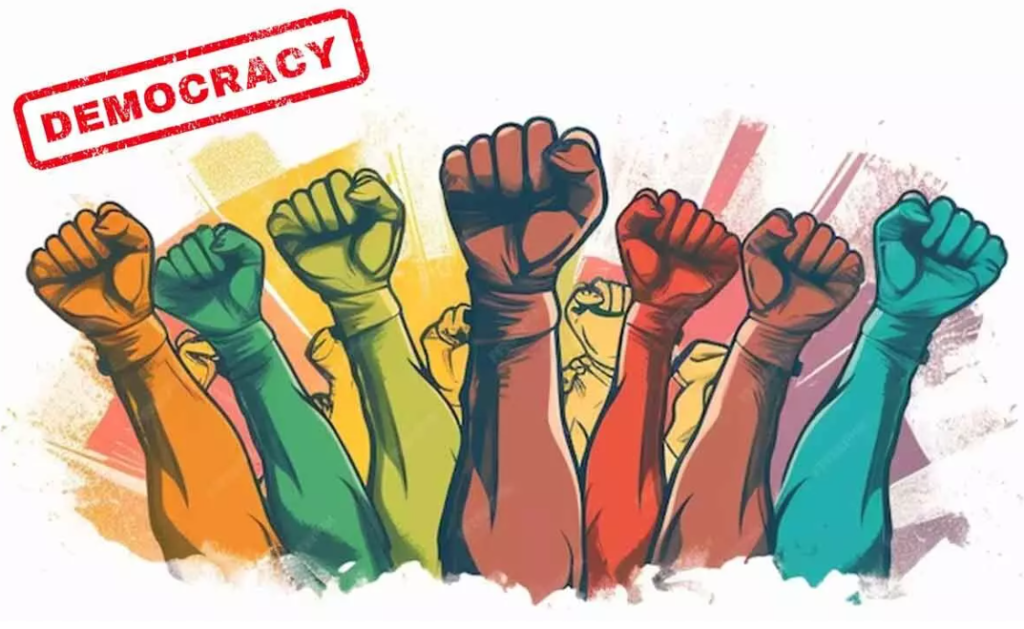DOES ELECTORAL BOND BONDS WITH DEMOCRACY?
DOES ELECTORAL BOND BONDS WITH DEMOCRACY?

India attained freedom on 15 August 1947 and our Constitution came in existence on 26th January 1950. The Constitution envisaged Parliamentary Democracy where elections were to be held both directly and indirectly for Lok Sabha and Rajya Sabha respectively. Direct elections means that after every 5 years elections will be held both at the center and the states. Holding of elections require funding for all the political parties who give tickets to their candidate to be elected as M.Ps and MLA’s. All the political parties have huge budget for elections availing them to make massive expenditure which runs into crore of Rupees.
 Since its inception lots of unaccounted money has been pumped in by individual, groups and corporate before and during the process of elections. The whole concept of funding the election was based on quid-pro-quo. i.e. the election funds were in lieu of return on investment (ROI) in form of kickbacks or commissions or contracts. It leads to serious economic offences promoting corruption at a massive scale.
Since its inception lots of unaccounted money has been pumped in by individual, groups and corporate before and during the process of elections. The whole concept of funding the election was based on quid-pro-quo. i.e. the election funds were in lieu of return on investment (ROI) in form of kickbacks or commissions or contracts. It leads to serious economic offences promoting corruption at a massive scale.
PROVISION CHECKING AND RESTRICTING DONATIONS.
 U/s 29C of Representation of People Act 1951 all political parties are required to declare donations exceeding Rs.20,000/- from any person or a company, failing which it disentitles the party from tax relief under Income Tax Act 1961.
U/s 29C of Representation of People Act 1951 all political parties are required to declare donations exceeding Rs.20,000/- from any person or a company, failing which it disentitles the party from tax relief under Income Tax Act 1961.
SECTION 2(E) OF FOREIGN CONTRIBUTION ACT 1976
It is a punishable offence which may extend to 5 years or fine or both if the political party accepts contribution from any foreign sources which is completely prohibited.
RULE 19 OF THE CONDUCT OF ELECTION RULE 1961. GOVERN THE MAXIMUM EXPENDITURE BY A POLITICAL PARTY.
Electoral Bond Scheme (EBS) was launched in 2017 to clean the system of corruption during political funding and move towards cashless economy.
 Electoral bond is a bearer instrument in a manner of promissory note and an interest free banking note whereby a citizen or a corporate is eligible to purchase the bonds through cheque or Digital payments.
Electoral bond is a bearer instrument in a manner of promissory note and an interest free banking note whereby a citizen or a corporate is eligible to purchase the bonds through cheque or Digital payments.
These bonds were only to be bought from notified branches of the public sector bank, State Bank of India for 10 days each in the month of January, April, July, and October. Electoral bonds to be purchased in any specified denominations and the payee can bestow it upon registered political party as donation of Rs.1000/-, Rs.10,000/-, Rs.1,00,000/-, Rs.10,00,000/- and Rs.1,00,00,000/- which can be encashed by the parties verified accounts within 15 days from the date of purchased.
Electoral bond will not carry the donor’s name but the payee will have to fulfill KYC norms at the Bank. No report is required to be submitted by the receiving parties of the donations received via
Electoral bond

Every party i.e. registered under section 29A of Representation of People Act (R.P Act )1951 and has secured at least 1% votes held in Lok Sabha. Political Party will be allotted a verified account by Election Commission of India (ECI). Electoral Bond transaction can be made only through this account.
FEATURES:
- Anonymity – Neither the donor nor the Political Party is obliged to reveal the name of the donor ,this is in conflicts with the basic Constitutional principle.
- Freedom of Information Under Article 19 (1) (A) of the Constitution
- Transparency – It is a convenient channel for the passage of Black Money.
- Asymmetrically opaque as the bonds are purchased through SBI. The political party knows who the donor is?
- Provisions such as elimination of a cap of 7.5% when it comes to corporate donations, elimination of the requirements that corporation must revealed their contribution in their book of accounts thus any troubled company, shell company can donate unlimited amount and that to anonymously.
- Instead of issuing an inventory of political donations in their annual statements of accounts Firm would only diverse an aggregates figure.
- Amended F.C.R. Act. to expand the definition of foreign firm with the express intent of the widening the ambit of Firms that could legally make political donations.
PETITION FILLED BY ASSOCIATION OF DEMOCRATIC REFORMS V/S UNION OF INDIA
The central issues- does the Electoral Bond Scheme 2018 (EBS) by granting anonymity to the cooperate donors to political parties, is against the spirit of free and fair elections which is the basic feature of the Constitution.

When the bench comprising of Chief Justice of India D.Y Chandrachur, Justice Sanjiv Khanna, Justice B.R Gavai, Justice J.B Pardiwala, and Justice Manoj Mishra declared EBS Unconstitutional.
 The first question the bench considered was whether the non-discloser of the identity of the contributors to the political parties violates the Right to Information of the voters. As it was held in previous cases that the Right to Information about the candidates contesting an election is part of the Right to Freedom of Expression under Article 19 (1)(A) the bench found it easier to extend the logic to include the Right to Information about the political parties under the same constitutional provisions.
The first question the bench considered was whether the non-discloser of the identity of the contributors to the political parties violates the Right to Information of the voters. As it was held in previous cases that the Right to Information about the candidates contesting an election is part of the Right to Freedom of Expression under Article 19 (1)(A) the bench found it easier to extend the logic to include the Right to Information about the political parties under the same constitutional provisions.
The political parties in the past has resisted civil societies attempt to bring them under Right to Information Act (RTI). February 15 judgment makes it clear that the political parties cannot claim any exemption from being accountable to the electorate.
We need to ponder on the subject whether EBS would have made any difference to the elections being conducted in India. Where the huge amount of illegal money is being spent by the political party and the candidates.
SUPREME COURT RULING BANS THE ELECTORAL BONDS:
 Electoral Bond Scheme (EBS) lacks transparency but the relation between the donor and the recipient cannot be denied.
Electoral Bond Scheme (EBS) lacks transparency but the relation between the donor and the recipient cannot be denied.
At the same time Electoral Bond Scheme also blocks the Right to Information to public at large. So, the Supreme Court strikes down the Electoral Bond Scheme on 15 February 2024. Supreme Court held that it violates the Right to information under Article 19 1 A of the Constitution. The court also directed. SBI to submit details of the Electoral bonds from 12 April 2019 onwards to the ECI. This will improve the details of the purchaser as well as the political party.

Further Courts Order to ECI to publish the information shared by SBI on its official website within one week from the date of receipt of the information i.e. 13 March 2024.
What is the way out?
STEPS SUGGESTED:
- National Election Fund can be created.

National Election Fund
The Election Commission can decide how the donations can be shared among the parties.

- Inderjeet Gupta Committee 1998 endorses state funding of elections.
|

Democracy or the self government has been earned with lots of efforts from a long drawn struggle between the Freedom Fighters and the British. Since Right to Information is a cornerstone of democracy ,was been voilated in this particular case thereby blocking the information to the voters who has right to seek information. Democarcy should prevail at any cost. Supreme Court has upheld the Right to Information of the voters declaring Electoral Bond Scheme (EBS) uncontitutuional in nature. This step will go a long way in strengthening the democratic values which are ingrained in our society
– MAMTA SINGH SHUKLA
(ADVOCATE DELHI HIGH COURT)
MOBILE – 9560044035
Email id – adv.mamtasinghshukla@gmail.com
